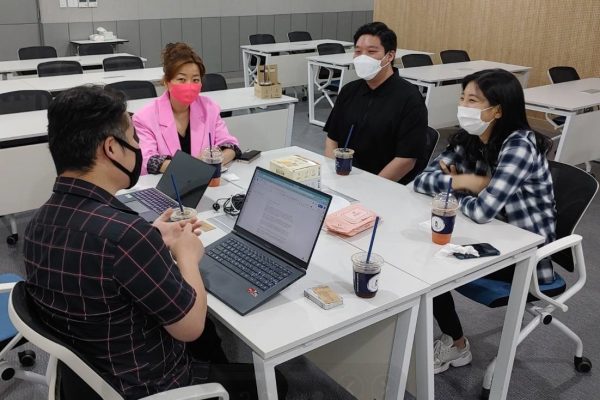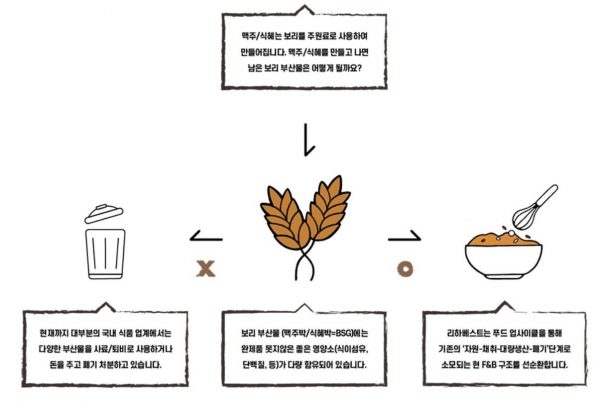The professional beer company OB Beer has been struggling withhow to utilize the beer by-products (brewer’s grain left over after removingsugar and starch to make beer, yeast, etc.) which more than 30 tons are madeper year. Beer by-products can be used to make food. It is low in calorie andhigh in nutrition. Recently, regulations have been eased so that products canbe made from beer by-products. If this problem is solved well, it could becomean exemplary case of ESG (environmental, social and governance) management.But, there were no ideas.
OB referred to the “100 Accelerator Program” of parent companyAB InBev's open innovation (companymaking attempts to innovate by making technology or products with externalcompanies by disclosing internal resources). This is a support program thatdiscovers startups with sustainable management and eco-friendly technologiesand ideas and help them to become companies that can last 100 years. However,it took a long time to introduce it to Korea.
Tired of waiting, OB Beer visited the “Global Startup Meetup” inSeoul Startup Hub (SBA). It is a competition stage for startups armed withfresh ideas and solid skills. Fifty startups participated, and eight companiesremained after evaluation.

SBA PartHead Cho Su-jin and RE:Harvest CEO Min Myoung-joon and OB Beer manager in ameeting (second from left) Itwas the startup RE:Harvest CEO Min’s turn to give presentation. The productpresented by RE:Harvest was an energy bar made from beer by-product. The tasteis similar to other energy bars out under market, but it has much lowercalories and preserves most of the nutrients from raw materials such as barleyand wheat. CEO Min introduced RE:Harvest as a “food upcycling” company that hasthe food by-product recycling technology which has grown to 49 trillion won in2019 and is considered an exemplary ESG example abroad.
As soon as CEO Min’s presentation began, OB Beer CV managerthought this was the startup it must work with. The executives of OB Beerunanimously agreed to have RE:Harvest as their partner.
Startups come up with ideas and develop technologies, and largecorporations use their internal resources to lead them. SBA provides a solidlink between startups and large companies. Synergy is created naturally. Thisis the moment of the birth of first successful case which SBA had dreamed of,shared growth model between large companies and startups.
The relationship among OB Beer, RE:Harvest, and SBA is stillstrong even after two years.
OB Beer recalled at the screening process that RE:Harvestscratched the itchy spot, quoting, “I thought of 10, but it showed more thanthat.” OB Beer wanted an eco-friendly and sustainable growth solution alongwith innovation, and it met RE:Harvest and created a model ESG case.
Collaboration between large corporations and startups sometimesleads to catastrophe. There are many cases where large companies with moneysteal technology, talent, and patents from startups. OB Beer emphasized that itnever had equity investment or acquisition in mind in the first place. It hadlooked forward to collaboration with startups and open innovation. It alsoannounced that it would create a sustainability management team as a newbusiness division within the purchasing team and hold a meetup startup everyyear to create more startups and more ESG cases.

RE:Harvest’sfood upcycling / Courtesy of RE:HarvestCEO Min Myoung-joon also gave a thumb up, saying that it grew thanksto OB Beer and SBA. CEO Min had experience in consulting and food startup, andhad gone through many difficulties in the beginning. It was fun and rewardingto set up a food upcycling company, but funding and commercialization were theobstacles he had to overcome.
That’s when SBA that reached out to CEO Min and helped him. SBA providedfunding for commercialization and space to RE:Harvest and also blockedunreasonable requests from companies that are investing. He said that he sawSBA as a reliable partner that served as a buffer between large companies andstartups, and that he was able to talk about problems he had.
He said he is very fortunate that a large company like OB Beerthat shares the same value is his partner. As he talked to the OB Beer staff,he felt that OB Beer had been thinking about eco-friendly management even beforeESG emerged, and it was looking at RE:Harvest as not only invest material, butas a partner.
SBA Part Head Choi had felt sorry for the startup supportprograms in the past. The discovering and meetup went well, but the managementand support after that was poor. As a result, she has seen many cases ofpromising startups disappearing. What Choi thought of was a model of realcooperation between large companies and startups, a model of mutual growthrather than growth on one direction.
To create this model, she first listened to the difficulties ofstartups. What was needed most was funding, especially to bring the initialidea to life. After a startup discusses business with a large company, therewere often cases where the collaboration failed because there was no money tomake products. Therefore, large companies are hesitant to invest. Theysometimes request only for technology.
Choi pondered what SBA could do between large companies andstartups to help. So, after discussing with large companies first, SBA came upwith a model that protects the startup's technology and helps grow together. Itis the responsibility of SBA to provide a work space for startups and leadmeetings with the media and investors. The first example is OB Beer andRE:Harvest.
Choi still remembers the first time she met CEO Min. She wastouched by the positive attitude and enthusiasm of RE:Harvest, so she providedeverything SBA had. That was when RE:Harvest met OB Beer, the company that wasconsidering open innovation. It was the right decision to connect OB Beer thatwas serious about ESG business, and CEO Min, who was actively involved in theESG business by showing around the factory and asking for opinions.

RE:Energybar made by collaboration of OB Beer, RE:Harvest, and SBA / Courtesy ofRE:HarvestOB Beer, RE:Harvest,and SBA are still sharing ideas with each other. The beer by-product byRE:Harvest can replace flour. In addition to energy bars, pizza dough, noodles,and cookies can also be made with it. However, it has fewer calories than wheatand is rich in nutrients including dietary fiber. The production cost is alsolow as it processes and commercializes beer by-products that have been disposedso far.
CEO Min says the goal is to supply RE:Harvest products to allfood sectors that use wheat flour. Here, he also expressed his ambition tocontinue making good cases with OB Beer, a good partner with a 30% market shareof the world beer, and SBA that has always been supportive.
Onthe other hand, the Seoul Metropolitan Government, the operating organizationof SBA, supports startup technology commercialization through “open innovation”between large global companies and innovative startups
so that promising companies can grow into unicorns and create a virtuous circle in the startup ecosystem. As the hub of Asia’s technological innovation, “Seoul” has been gaining distinguished attention as a global start-up city for its high R&D capacity, high patent applications, active investment of Seoul Metropolitan Government in new industries such as AI, fin-tech, and life sciences, and support for the start-up ecosystem.
Within the promotion of start-ups in the technology sector, Seoul Metropolitan Government, Maekyung Media Group and Seoul Startup Hub joined forces to organize an on/offline global startup festival for start-ups from all over the world from September 15 through 17 under the name of 'Try Everything', which aims to share scale-up insight and to attract start-ups in the tech sector to make appointments with potentially interested investors."
